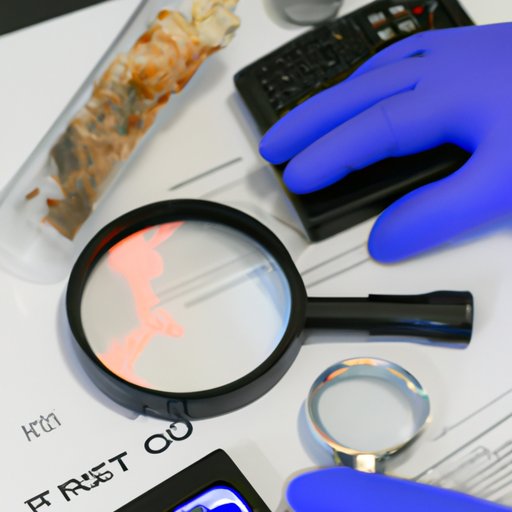Introduction
Forensic science is the application of scientific principles to the investigation of criminal activity. It is a broad field that encompasses many different disciplines, each with its own unique set of skills and techniques. From criminalistics to toxicology to digital forensics, students who pursue a degree in forensic science will learn how to apply scientific methods to solve real-world problems.
Exploring the Different Fields of Forensic Science: What Do Students Study?
Forensic science is divided into several distinct areas of study. Here is a brief overview of some of the most common fields of forensic science:
Criminalistics
Criminalistics is the study of physical evidence from crime scenes. Criminalists use their knowledge of chemistry, physics, biology, and other sciences to identify, analyze, and interpret evidence such as fingerprints, ballistics, and bloodstains.
Toxicology
Toxicology is the study of the effects of toxic substances on living organisms. Toxicologists are responsible for analyzing and interpreting data related to drugs, poisons, and other hazardous materials.
Digital Forensics
Digital forensics is the analysis of digital evidence, such as computer files and emails, to investigate cybercrime and other electronic crimes. Digital forensics specialists must be knowledgeable in computer technology and software.
Forensic Psychology
Forensic psychology is the study of the psychological aspects of criminal behavior. Forensic psychologists are trained to evaluate mental health issues, offer expert testimony in criminal cases, and provide treatment to offenders.
A Comprehensive Guide to Understanding the Basics of Forensic Science
In order to understand the fundamentals of forensic science, one must first have an understanding of the investigative process. This includes examining physical evidence, analyzing biological evidence, investigating documents, and collecting and preserving evidence. Here is a look at some of the key components of the investigative process.
Examining Physical Evidence
Physical evidence is any object or material that can help establish the facts of a case. Physical evidence can include weapons, clothing, tools, fingerprints, and tire tracks. Examining physical evidence requires special training and skills, including the ability to recognize, collect, and preserve evidence.
Analyzing Biological Evidence
Biological evidence is any material that contains genetic information, such as DNA, blood, and saliva. Analyzing biological evidence requires specialized laboratory equipment and techniques, such as polymerase chain reaction (PCR) and gel electrophoresis.
Investigating Documents
Document examination is the process of examining written material to determine its authenticity. Document examiners must be knowledgeable in handwriting analysis, ink analysis, and typewriter identification. They also need to understand the legal implications of document examination.
Collecting and Preserving Evidence
The collection and preservation of evidence is essential to the success of any investigation. Evidence must be collected and preserved according to established protocols and standards in order to ensure its reliability and integrity. Collection and preservation techniques vary depending on the type of evidence being collected.

Investigating the Types of Courses Offered in Forensic Science Programs
Students interested in studying forensic science should be aware of the types of courses offered in forensic science programs. Most forensic science programs require a core curriculum of courses in chemistry, biology, and physics. In addition, students may choose to take elective courses in areas such as criminal justice, psychology, and computer science.
Required Courses
The following courses are typically required in a forensic science program:
- Chemistry
- Biology
- Physics
- Criminal Law
- Statistics
- Forensic Anthropology
Elective Courses
In addition to the required courses, students may choose to take elective courses in areas such as:
- Forensic Entomology
- Forensic Odontology
- Forensic Pathology
- Forensic Photography
- Forensic Toxicology
- Forensic Document Examination

Uncovering the Benefits of Studying Forensic Science
Studying forensic science can provide students with many benefits, including job security, variety of career options, and professional recognition. According to the Bureau of Labor Statistics, employment of forensic science technicians is projected to grow 14 percent from 2016 to 2026, faster than the average for all occupations. Additionally, earning a degree in forensic science can open up a variety of career opportunities in law enforcement, private consulting, and academic research.
Examining the Career Opportunities Available with a Degree in Forensic Science
With a degree in forensic science, graduates can pursue a number of career paths, including:
- Law Enforcement – Forensic scientists may work for local, state, or federal law enforcement agencies. They may also serve as consultants or advisors to law enforcement agencies.
- Private Consulting – Forensic scientists may work for private consulting firms as experts in their field.
- Academic Research – Forensic scientists may work in academic or research settings to conduct research and develop new technologies.

A Look at the Current Trends in Forensic Science Education
In recent years, there has been an increase in the use of online learning and interdisciplinary approaches to forensic science education. Online learning has enabled students to access course materials and participate in discussions with classmates from anywhere in the world. Additionally, advances in technology have allowed for more efficient and accurate analysis of evidence.
Conclusion
Forensic science is a rapidly growing field that offers exciting opportunities for those who are interested in pursuing a career in the criminal justice system. Students who pursue a degree in forensic science will gain valuable knowledge and skills that will allow them to succeed in this highly competitive field. With the right educational background, a degree in forensic science can open up a world of possibilities.
(Note: Is this article not meeting your expectations? Do you have knowledge or insights to share? Unlock new opportunities and expand your reach by joining our authors team. Click Registration to join us and share your expertise with our readers.)
